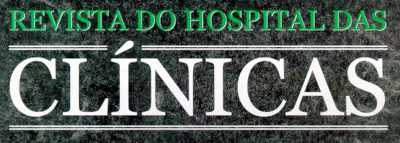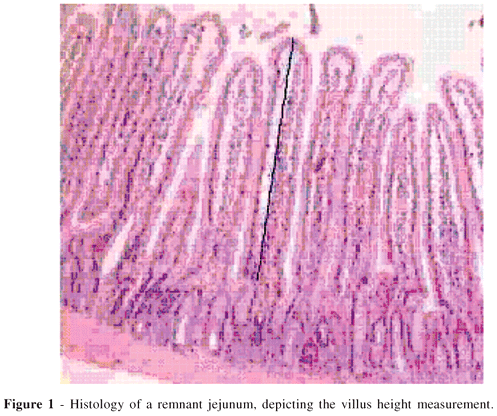Short-bowel syndrome is responsible for significant metabolic alterations that compromise nutritional status. Glutamine is considered an essential nutrient for enterocytes, so beneficial effects from supplementation of the diet with glutamine are hypothesized. PURPOSE: In this study, the effect of a diet enriched with glutamine was evaluated in rats undergoing extensive small bowel resection, with analysis of postoperative weight loss and intestinal morphometrics of villi height, crypt depth, and thickness of the duodenal and remnant jejunal mucosa. METHODS: Three groups of male Wistar rats were established receiving the following diets: with glutamine, without glutamine, and the standard diet of laboratory ration. All animals underwent an extensive small bowel resection, including the ileocecal valve, leaving a remnant jejunum of only 25 cm from the pylorus that was anastomosed lateral-laterally to the ascendant colon. The animals were weighed at the beginning and end of the experiment (20th postoperative day). Then they were killed and the remnant intestine was removed. Fragments of duodenal and jejunal mucosa were collected from the remnant intestine and submitted to histopathologic exam. The morphometric study of the intestinal mucosa was accomplished using a digital system (KS 300) connected to an optic microscope. Morphometrics included villi height, crypt depth, and the total thickness of intestinal mucosa. RESULTS: The weight loss comparison among the 3 groups showed no significant loss difference. The morphometric studies showed significantly taller duodenal villi in the glutamine group in comparison to the without glutamine group, but not different from the standard diet group. The measurements obtained comparing the 3 groups for villi height, crypt depth, and thickness of the remnant jejunum mucosa were greater in the glutamine-enriched diet group than for the without-glutamine diet group, though not significantly different from with standard-diet group. CONCLUSIONS: In rats with experimentally produced short-bowel syndrome, glutamine-enrichment of an isonitrogenous test diet was associated with an improved adaptation response by the intestinal mucosa but not reduced weight loss. However, the adaptation response in the group receiving the glutamine-enriched diet was not improved over that for the group fed regular chow.
Glutamine; Short-bowel syndrome; Intestinal mucosa





